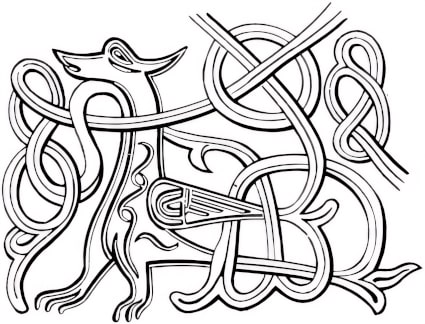We’ve finally reached the end of the Happy Days theme song, I mean, the week!
Saturday is another difficult day. So far, I’ve given each day to a member of Vladimir’s pantheon, so you might think for Saturday I’d go with the last from the list above, Simargl. Simargl is interesting, and probably worth exploring in another blog post some day, but when we get right down to it, we’re not really sure if Simargl was even a real deity! The best guess at an etymology is that it’s a corruption of the Persian Simurgh, and the historian Boris Rybakov followed this vein to suggest Simargl was a wolf-eagle hybrid and lord over seed and vegetation, but this is pretty speculative. Another theory holds that Simargl is actually an accidental conflation of two separate beings Sem and Rgel, which may or may not also be vegetative deities. Even more so than the enigmatic Khors (who at least gets mention in the Tale of Igor’s Campaign), we really know nothing about Simargl beyond the name, which may actually be two names, and everything else is speculative linguistics.

If we instead try to extrapolate Saturday from the role of the syncretic deities, the task is still difficult. In Mesopotamian astronomy, the planet Saturn was associated with the deity Ninurta, a god of agriculture and healing. Why? Possibly because Saturn is the slowest planet, and there was a myth about Ninurta and a turtle. [see below] When the Greeks were translating the planets, they focused on the fact that he was the son of Enlil (the Sumerian equivalent of the later Babylonian Marduk), but rather than choosing one of Zeus’ many sons, they chose his father, Cronus. Cronus has some agricultural connotations, either because he ruled over a prosperous golden age, or because he traditionally held a sickle (which he used to castrate his father, Uranus). The Romans equated Cronus with Saturn, an agricultural deity and father of Jupiter, and also the quintessential father time. The time domain may actually come from confusion between Greek Cronus and Chronus, but it also has some amount of sense, what with the passing of the seasons. By the time we get to the Norse, there is apparently no good equivalent, and thus ‘Saturday’ is the only English day with a Latin rather than Germanic root.
So, this leaves us with slowness, agriculture, seasons, time, or just throwing up our hands and sticking with Latin Saturn. Simargl, if he existed, is actually not unreasonable given the possible connection to sowing of seeds. However, I think I’ll go in a different direction and choose Marzanna, alias Morena. Marzanna is a Western Slavic deity, not attested in any writings, but still encountered in modern folk traditions. The story goes that she was married to the god of spring, Jarilo, but slew him for his infidelities. Still, she felt remorse, and wasted away into despair. Her actions and demise are played out again year after year, creating the seasons in a sort of take on the Persophone myth. She is associated with death and winter, and her effigy is burnt in the spring to mark winter’s passing. Her close connection with time and the seasons make her, I think, a decent fit for Saturn, plus I think her myth is one of the most interesting of the Slavic tales.

(An aside, I never really got into the why of associating planets with deities in Mesopotamia. There’s some guesswork here, but each planet has certain attributes that separate it from the others. Mars is visibly red, like blood or rusted iron, so war seems logical. Mercury twinkles, and this seems to lead to an association with magic. Jupiter is the highest in the night sky, and so gets heavenly connotations, with either ruling, thunder, or both. Venus appears with the sun at dawn, and from there is associated with birth and fertility. Saturn moves most slowly in the sky.)
I hope you enjoyed this little foray into history, mythology, and language!